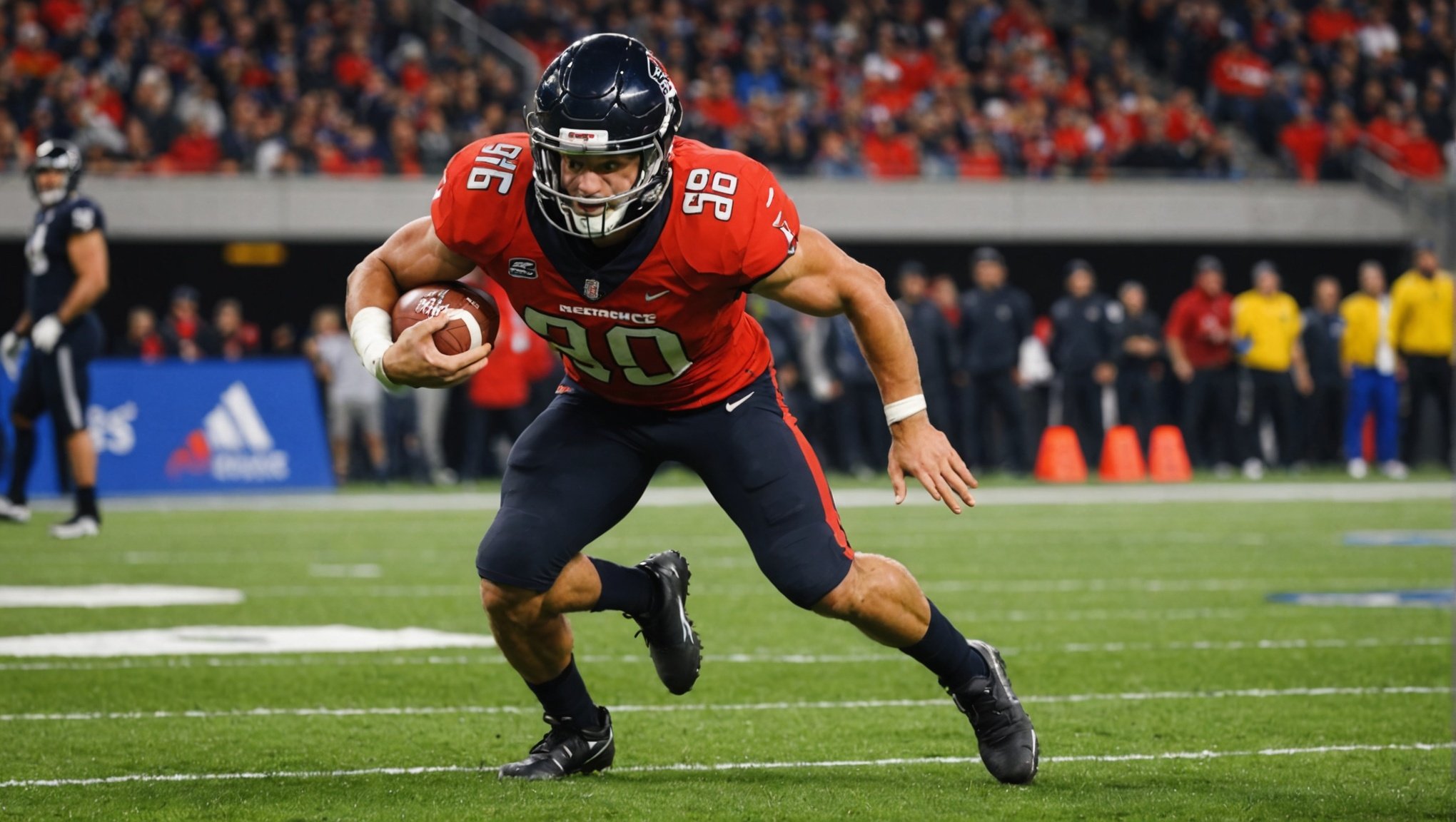Nutrition plays a vital role in a football player's performance, influencing both agility and endurance on the field. A well-balanced diet fuels the body, enhancing speed and stamina during intense matches. Understanding how specific nutrients impact these athletic attributes can help players optimize their training and recovery. This exploration delves into the essential dietary components that empower athletes to reach peak performance, enabling them to excel when it matters most. Discover how proper nutrition is the unseen engine driving success in football.
The Role of Nutrition in Athletic Performance
Understanding the role of nutrition for athletes is crucial in enhancing sports performance. Nutrition acts as the fuel that powers athletes' bodies, impacting their agility and endurance. The right balance of nutrients can significantly improve an athlete's physical capability, enabling them to perform at their best.
In parallel : Unlocking Local Loyalty: Innovative Community Engagement Strategies for Football Clubs
Key nutrients such as carbohydrates, proteins, and fats are essential for maintaining energy levels and muscle repair. Carbohydrates are the primary source of energy, especially during high-intensity activities. Proteins play a vital role in muscle recovery and growth, while fats provide a concentrated source of energy for prolonged activities.
The science behind nutrition and physical capability highlights the importance of micronutrients like vitamins and minerals. These elements support various bodily functions, including oxygen transport and muscle contraction, which are critical during athletic performance. For example, iron is essential for oxygen delivery to muscles, while calcium and vitamin D are crucial for bone health.
Topic to read : Top Mental Preparation Strategies for Football Goalkeepers: Elevate Your Pre-Match Game
Incorporating a well-balanced diet tailored to an athlete's specific needs can enhance performance, reduce injury risk, and speed up recovery. By prioritising nutrition, athletes can optimise their training outcomes and achieve their performance goals effectively.
Essential Nutrients for Football Players
Football players require a strategic intake of nutrients for football performance to excel on the field. The demands of the sport necessitate a diet rich in both macronutrients and micronutrients, ensuring peak physical condition and endurance.
Macronutrients: Carbohydrates, Proteins, and Fats
Carbohydrates are vital, providing the primary energy source needed for the intense bursts of activity typical in football. Consuming adequate carbohydrates before and after training sessions can help maintain energy levels and support recovery. Proteins are crucial for muscle repair and growth, enabling players to recover quickly from the physical toll of matches and training. Fats, although often overlooked, play a significant role in providing sustained energy for longer periods of play.
Micronutrients: Vitamins and Minerals
Micronutrients, though required in smaller amounts, are equally important. Vitamins such as B-complex aid in energy production, while minerals like zinc and magnesium support muscle function and recovery. Iron is essential for oxygen transport, crucial for endurance, and calcium strengthens bones, reducing injury risk.
Hydration: The Unsung Hero of Performance
Proper hydration is critical in maintaining performance levels. Dehydration can impair cognitive and physical functions, leading to decreased performance and increased injury risk. Thus, maintaining optimal fluid levels is essential for football players to perform at their best.
Dietary Recommendations for Optimal Performance
To achieve an optimal diet for athletes, particularly football players, understanding the recommended daily intake of key nutrients is essential. Football players should focus on consuming a balanced mix of carbohydrates, proteins, and fats. Carbohydrates should make up about 55-60% of daily caloric intake, providing the energy needed for high-intensity activities. Proteins, crucial for muscle repair, should account for 15-20%, while fats should comprise about 20-25%.
Meal Timing Strategies
Strategic meal timing can significantly enhance performance. Consuming a carbohydrate-rich meal 3-4 hours before a game ensures energy stores are maximised. A small snack, such as a banana or energy bar, 30-60 minutes before the game can provide an additional energy boost. Post-game, a combination of proteins and carbohydrates within 30 minutes aids in recovery and muscle repair.
Importance of Pre-Game and Post-Game Nutrition
Pre-game nutrition focuses on energy storage, while post-game nutrition is critical for recovery. A pre-game meal should be high in carbohydrates, moderate in protein, and low in fat to prevent digestive discomfort. Post-game, a protein shake or a balanced meal with lean protein and complex carbohydrates helps replenish glycogen stores and repair muscle fibres.
Comparison of Popular Diets for Football Players
Choosing the right diets for athletes can significantly impact performance and recovery. Football players often explore various dietary approaches to optimise their game.
Standard American Diet vs. Mediterranean Diet
The Standard American Diet (SAD) is typically high in processed foods and saturated fats, offering convenience but lacking in essential nutrients. In contrast, the Mediterranean Diet focuses on whole foods, such as fruits, vegetables, whole grains, and healthy fats like olive oil. This diet is rich in antioxidants and anti-inflammatory properties, supporting heart health and reducing injury risk. Football players might find the Mediterranean approach beneficial for sustained energy and quicker recovery.
Ketogenic Diet for Endurance
The Ketogenic Diet is high in fats and low in carbohydrates, promoting fat as the primary energy source. While it can enhance endurance by increasing fat oxidation, it might not suit high-intensity activities like football due to limited glycogen stores. Athletes considering this diet should evaluate its impact on their specific energy needs and performance goals.
Plant-Based Diets: Pros and Cons
Plant-Based Diets are gaining popularity among athletes for their health benefits and environmental impact. These diets are rich in fibre and antioxidants, promoting recovery. However, football players must ensure adequate protein and vitamin B12 intake to maintain muscle mass and energy levels.
Practical Tips to Enhance Agility and Endurance
Enhancing agility and endurance requires a strategic approach to athletic nutrition. By incorporating effective meal prepping, athletes can ensure they receive the necessary nutrients without compromising their training schedules.
Strategies for Meal Prepping
Meal prepping is essential for maintaining a balanced diet, allowing athletes to focus on training. Preparing meals in advance ensures consistent nutrient intake, which is crucial for performance. Focus on meals rich in carbohydrates for energy, proteins for muscle repair, and healthy fats for sustained energy.
Incorporating Supplements Safely and Effectively
Supplements can be a valuable addition to an athlete's diet when used correctly. Essential supplements like protein powders, omega-3 fatty acids, and multivitamins can support muscle recovery and overall health. However, it's important to consult with a nutritionist to avoid over-supplementation and ensure they complement your dietary intake.
Balancing Nutrition with Training Schedules
Balancing nutrition with training schedules is key to optimising performance. Athletes should plan meals around their training sessions, ensuring they consume nutrient-rich foods at optimal times. Eating a carbohydrate-rich meal before training can boost energy levels, while a protein-rich snack post-training aids in recovery. By aligning nutrition with training, athletes can maximise their agility and endurance.
Real-Life Case Studies of Successful Athletes
Exploring athlete nutrition case studies offers valuable insights into the dietary habits of elite football players. These case studies reveal how tailored nutrition plans contribute to athletic success and highlight lessons learned from both triumphs and challenges.
Examination of Dietary Regimes of Elite Football Players
Elite football players often follow meticulously planned dietary regimes to maintain peak performance. For instance, a renowned player's success was attributed to a diet rich in lean proteins, complex carbohydrates, and healthy fats, emphasising the importance of balanced nutrition. Another player's journey demonstrated the impact of hydration in enhancing endurance and recovery.
Lessons Learned from Athletes' Nutritional Successes and Failures
From these case studies, several lessons emerge. Successful athletes often prioritise nutrient timing, ensuring energy availability during training and games. However, some athletes faced setbacks due to inadequate recovery nutrition, underscoring the critical role of post-exercise meals in muscle repair.
Insights from Nutritionists Working with Professional Teams
Nutritionists working with professional teams provide tailored advice, focusing on individual needs and performance goals. They stress the significance of adapting diets based on training intensity and personal health requirements. Their expertise helps athletes navigate dietary challenges, optimising their nutritional strategies for sustained success.
The Future of Sports Nutrition
As the field of sports nutrition evolves, innovations in sports nutrition are transforming how athletes fuel their performance. These advancements are paving the way for more tailored and effective nutritional strategies.
Emerging Trends in Nutritional Science
Recent developments in nutritional science are reshaping dietary approaches. There is a growing focus on functional foods that offer health benefits beyond basic nutrition, such as reducing inflammation or enhancing recovery. Additionally, the integration of plant-based proteins is gaining traction, driven by their sustainability and health benefits.
Technology in Nutritional Tracking for Athletes
Technology plays a pivotal role in modern sports nutrition. Wearable devices and apps provide real-time data on hydration, nutrient intake, and energy expenditure. This information allows athletes to make informed decisions about their diet, ensuring they meet their specific needs for optimal performance.
The Role of Personalized Nutrition in Athletic Performance
Personalized nutrition is becoming increasingly important, as it considers an individual's unique genetic makeup, lifestyle, and performance goals. By tailoring nutritional plans to these factors, athletes can enhance their performance and recovery. This approach ensures that dietary strategies align closely with an athlete's specific requirements, maximising their potential on the field.













